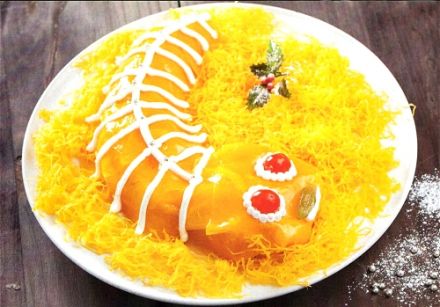Portuguese nuns have doubled as egg yolk–slinging pastry chefs for hundreds of years, but lampreia de ovos is one of their most unique offerings. This dessert replica of a terrifying, ancient sea monster—made from 50 egg yolks—is a Christmas tradition.
According to popular lore, nuns made eggs a convent staple after discovering that egg whites kept their habits sharp and wrinkle-free during ironing. After laying claim to Brazil in 1500, Portugal started importing sugarcane as an abundant, inexpensive ingredient. Resourceful nuns looked at all the extra egg yolks and, with the nation’s gold mine of sugar, began creating rich, yellow desserts to support themselves.
But why the lamprey, an eel-like, bloodsucking fish with several rows of spiraling, sharpened teeth, of all things? As one travel guide puts it, the Portuguese “so love this ugly river fish they make golden egg effigies of it for festive occasions.” For hundreds of years, the fish served as a suitable red-meat replacement (its texture is comparable to slow-cooked beefsteak) for penny-pinchers and Christians abstaining for Lent. The oldest known Portuguese cookbook, dating back to the 16th century, includes only one fish recipe. It’s for lamprey. A stew made from the fish and its blood is still popular throughout the country.
Lampreia de ovos requires no actual parts of the lamprey. All you need to make one is sugar syrup, almonds, and eggs. First, build your lamprey’s winding body from a paste of sweetened yolks and grated almonds, then dress it in sheets of yolks and syrup (“capes”) and strands of beaten egg and sugar. Once you’ve assembled the lamprey’s basic shape, you can brown it in a hot oven or use a red-hot iron to recreate its signature spots.
Finally, don’t forget to animate your new friend with a set of candied cherry eyes and a couple of peeled almond teeth. Top it off with sugary egg threads. Delicious and... not so horrific after all.
Egg threads
- Heat the sugar with 300 ml of water and boil until the syrup reaches the thread stage, 103°C / 206°F.
- Separate 36 eggs to obtain the yolks, reserving the whites for another use.
- Transfer the yolks into a plastic squeeze bottle with a nozzle (the kind used for mustard, for example).
- Squirt a little egg yolk into the boiling syrup and cook for a minute. Using a fork, make quick circular motions in the syrup to create very thin strands of egg.
- Remove the strands with a strainer and pour directly into a bowl of cold water. Drain immediately and transfer to paper towels. Set aside on a plate - don't leave them for long on the paper towel, since they may stick.
- Repeat the process with all the egg.
- If you notice the syrup has reduced too much, add a little water to the pan.
Lamprey
- Add the grated almonds to the syrup. Mix well and add the remaining 14 egg yolks.
- Return the pan to the heat and stir constantly until the mixture forms a mass and you can see the bottom of the pan.
- Remove from the heat.
Finishing
- Mold the mixture into the form of a lamprey (an eel-shaped body with a large head) on an ovenproof serving dish
- Decorate the head using 2 cherries for the eyes and almonds for the teeth.
- Place the egg yolks strands all around it.
- Let it brown iunder the broiler for a few seconds to create the spotted skin of the lamprey. You can also use a torch.
- Beat one or two egg whites with icing sugar until stiff and decorate the lampreia de ovos with very thin sugar threads as shown in the above picture.
Photo: mulher portuguesa

-

 Recipes
Recipes
-

 Products
Products
-

 Entertaining
Entertaining
-

 Chefs
Chefs
-

 Hints & Tips
Hints & Tips
-

 Glossaries
Glossaries









